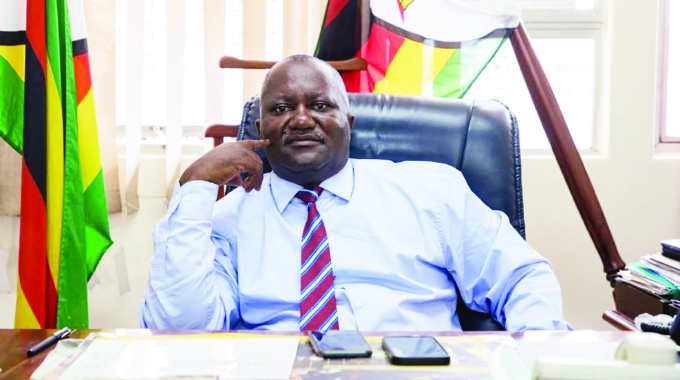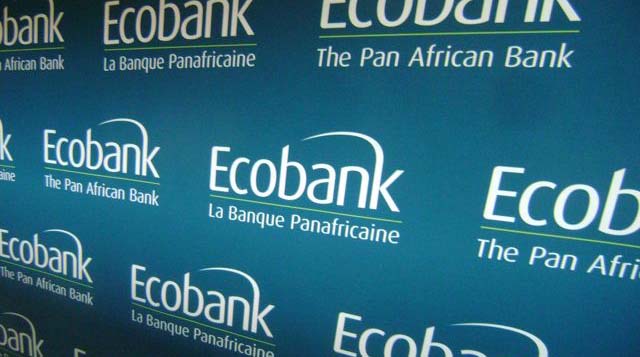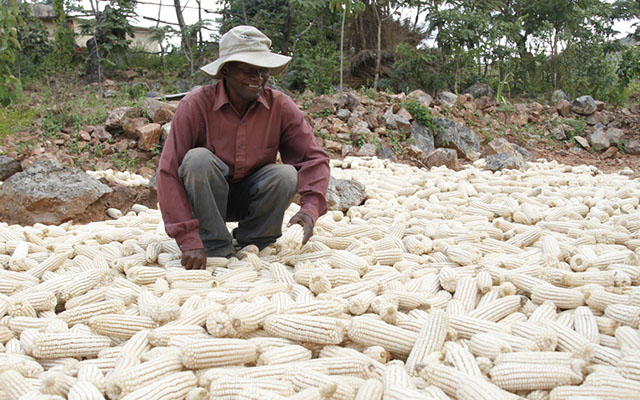Masvingo investment drive pays off

The Minister of State for Masvingo Provincial Affairs and Devolution Ezra Chadzamira (EC) was reappointed to the post by President Mnangagwa for another term after a first five year stint that started in 2018. Minister Chadzamira has been steering the socio-economic transformation of Masvingo province in line with Vision 2030. Herald Masvingo Bureau Chief George Maponga (GM) speaks to Minister Chadzamira on the province’s developmental prospects and the future. Below are excerpts of the interview.
GM: Following your reappointment as the Minister of State for Masvingo Provincial Affairs and Devolution by President Mnangagwa for a second tenure at Benjamin Burombo (the provincial Government offices), what are some of your priorities and plans to continue engendering socio-economic development in Masvingo?
EC: My office will continue to enhance co-ordination and implementation of programmes and projects which are central to the realisation of the NDS1 targeted results. Monitoring and evaluation of the strategy will be through Thematic Working Groups (TWGs) as part of the consultative process.
Therefore, the following priority areas will be given attention: Lake Mutirikwi 5MW hydroelectric power plant which is now over 70 percent complete. A further two hydroelectric power plants are expected to be rolled out along Mutirikwi River with each plant having a capacity of 5MW. There is also a 15MW hydroelectric power plant that will be built at Tugwi-Mukosi where contractors are already in place. A few regulatory issues like ZINWA approval is delaying commencement of works.
The office will vigorously engage with all relevant stakeholders to make the giant water body start to repay itself. On economic development and investment, we are challenging local authorities to open up their space by attracting high value investments riding on the improvements in the Ease of Doing Business.
Indeed, ZIDA has come up with exciting packages that local investors need to embrace like capital matching in Tourism and the Mining sector. Local investors need to register with ZIDA as well and ZIDA will do the rest for them like capital sourcing.
It is on that note that my office will intensify creation of platforms to interact with ZIDA and other investment enhancing agencies like PRAZ, ZIMTRADE, ZNCC, CZI, Chamber of Small and Medium Enterprise (SMEs) among others.
My office would demand properly crafted and marketed district development plans that seek to grow local area GDPs. We have since realised that local authorities seem to exist to sell only stands giving little attention to the economics side. That should end forthwith.
There is a need for robust investment promotion initiatives. The office will demand ZIMSTAT to establish economic data that tracks economic progress of the province. The office will enhance co-ordination of the implementation of the Pfumvudza/Intwasa programme which is implemented as a social safety net assisting mainly the poor.
It is an important vehicle that seeks to secure household food security. My office will ensure that every district gets 200 hectares of irrigation. The idea is to use our abundant resource, which is water coupled with rich soils available throughout the province. Rain-fed agriculture is failing in our province especially in agro-ecological zones 4 and 5.
Government commends development partners like SIRP, FAO, Takunda Care, SAT, Mwenezi Development Training Centre and other players for funding rehabilitation of smallholder irrigation schemes across the province. Formation of an agricultural company in each rural village using the Mbuyamaswa model under Agriculture 8.0 which was launched by President Mnangagwa in August 2023.
The province has already established the Nyahombe Irrigation Scheme with 80 hectares. The scheme received centre pivots from Government and it is the first communal scheme to use Tugwi Mukosi water. More such schemes are in the pipeline. My office will continue to roll out resettlement re-organisation to realise implementation of agriculture flagship projects like the lucerne project in Chiredzi and large scale citrus, crop and livestock production in the Nuanetsi Ranch to fully utilise Tugwi Mukosi Dam waters. The master plan has to be operationalised following its approval by Cabinet. My office will ensure development around the dam and beyond takes off in this second term.
We will also support Sino Bikita Minerals in its quest in the construction of a lithium processing plant as part of minerals beneficiation initiatives adopted by the Second Republic. My office will coordinate the commencement of Runde Tende Dam construction to add a further 35 000ha of irrigation to the designated 40 000 ha from Tugwi Mukosi Dam.
The province has planned to substantially increase housing stock provided through numerous housing projects being undertaken by local authorities and land developers. In the next five years, over 25 000 housing stands should be provided by local authorities, including civil servants houses which will be constructed by the Government through PPPs.
GM: With regards to NDS 1 targets and the general march towards Vision 2030, how much ground has been covered in Masvingo to pivot the province towards attaining Vision 2030?
EC: The attainment of Vision 2030 from the current baseline requires the province to reinvigorate and re-orient itself towards a transformative agenda of Managing for Development Results (MfDR) which emphasises the achievement of results that positively impact on the economy and people’s livelihoods. The NDS1 is underpinned by integrated Results Based Management.
IRBM inculcates a culture of high performance, quality service delivery, measurement, goal clarity, continuous improvement and accountability across the public sector. Through a consultative process, the province crafted its provincial economic development Plan in 2021 guided by NDS1.
The following key priority areas were identified: inclusive economic growth and stability, food and nutrition security infrastructure and utilities, tourism development, health and wellbeing, human capital development, value chain and transformation, governance and devolution.
From these eight thematic areas, more than 10 high impact projects have been implemented by the Second Republic in Masvingo. These include the Mapfura Processing and Value Addition Plant in Mwenezi. Mapfura/Marula is the new gold for Mwenezi folks. Villagers are pocketing at least US$5 million annually from selling the indigenous fruit to a factory opened by the President at Rutenga Growth Point. The Mwenezi Mapfura industrial park is a processing and value addition plant set by Government for rural communities to benefit from locally available resources.
The Tanganda-Ngundu road rehabilitation. A good infrastructural network connects supply chains and enables the transportation of goods and services. The Nemamwa Gender-Based Violence One Stop Centre in Masvingo provides comprehensive care for survivors by providing direct services with focus primarily on medical services, psycho-social services and counselling services under one roof. We also have the GZU Campus Radio Station in Masvingo, Avuxeni Community Radio Station in Chiredzi, GZU’s Simon Mazorodze School of Medical and Health Sciences and Kamungoma Massacre Memorial Monuments in Gutu district. The Government’s approval of the takeover of Bikita Minerals by Sino Mine which consequently led to a USD$200 Million investment in a new spodumene processing plant and expansion of the petalite plants by Sino Bikita Minerals. The province also provided 85 000 hectares from President Mnangagwa as patron of the Development Trust of Zimbabwe and 1091 settled farmers have been given permits. More permits will be issued in the Chingwizi, Lundi and Masangula sections.
Sugar-cane production at Kilimanjaro Sugarcane Project has seen a total of 4000 hectares secured from Tongaat Hullets Zimbabwe for indigenous farmers. We are also happy that the province is achieving an upward trend in wheat production. This year, 2 138.6 hectares of wheat were planted. It is also pleasing to note that a record 47 clinics were built by local authorities using devolution funds in Masvingo since the advent of the Second Republic.
GM: What are the key sectors that will power the province’s growth prospects and targets over the next 7 years?
EC: The province will target the expansion of sugar production from the current 432 000 tonnes annually to over 900 000 tonnes by 2030. This will be achieved through building capacity of out-grower farmers to increase production and full capacity utilisation of the Kilimanjaro plots in Chiredzi. With an additional 40 000 hectares expected to be developed using Tugwi Mukosi water, this target is achievable. The province will also continue to implement the Pfumvudza/Intwasa programme which is implemented as a social safety net assisting mainly the poor. It is an important vehicle that seeks to secure household food security. Production of traditional grains will be promoted and implemented in Chivi, Mwenezi, Zaka and Chiredzi districts. The GZU Innovation Hub in Chivi comes in handy in this initiative. The province will continue to roll out resettlement reorganisation to realise implementation of agriculture flagship projects like the lucerne project in Chiredzi district and large scale citrus, crop and livestock production in the Nuanetsi Ranch to fully utilise Tugwi Mukosi Dam waters.
The province will prioritise clearance of backlog for mine registration applications which currently stands at 748 to ensure increased production. We also have plans to establish three gold service centres at Bhuka, Mashava and Gutu(Felixburg) by 2025, establishment of two gold mines in Ngundu and Mashava, which are currently at exploration stage, scaling up Lithium production from 17 960 tonnes in 2020 to over 150 000 tonnes by 2030.
We are also pinning our hopes for growth on the energy sector to achieve energy security.
The province is overseeing implementation of various projects some of which I have mentioned above. The province is also anchoring its growth on the tourism sector and we are already working flat out to create a conducive business environment by working closely with all tourism sector regulatory authorities that include the responsible ministry, the Zimbabwe Tourism Authority and other players.
GM: How far has the province gone in fulfilling President Mnangagwa’s mantra of leaving no one and no place behind?
EC: We are trying to fulfil the President’s vision through the devolution initiative. Devolution funds have been released to local authorities to fund projects that address poverty in rural areas. The province has so far received over $3.9 billion under devolution this year and the funds were mostly used to fund construction of health service centres, schools, water provision, sewer reticulation and rehabilitation of roads. We will intensify development co-ordination in all programming and even capacitate local authorities in utilising devolution funds. The office will fulfil that constitutional mandate of service delivery.
GM: Which signature projects implemented by the Second Republic under President Mnangagwa do you think have made the biggest impact in uplifting the lives of people in Masvingo?
EC: The following projects have had a huge impact:
The Mapfura/Marula Processing Plant in Mwenezi. The plant has created employment and self-employment for locals, reducing rural to urban migration. The project has advanced traditional knowledge in competitive indigenous fruits, grain crops, livestock, apiculture and aquaculture breeds.
The borehole drilling programme has seen 228 boreholes successfully drilled.
The Smallholder Irrigation Revitalisation Project (SIRP) rehabilitated 21 Irrigation schemes comprising of 1200 ha benefitting 1850 households
GM: Masvingo recently hosted an inaugural business expo to showcase investment opportunities in the province, was the expo a success and what were the highlights of that expo?
EC: The province worked with Zimbabwe National Chamber of Commerce, the Confederation of Zimbabwe Industries, Chamber of Small and Medium Enterprises, Line Ministries, Departments and Agencies (MDAs), private sector, development partners, in organising the Second Edition of Masvingo Business Expo. The expo was planned under the Public, Private Partnership (PPP) and Total Engagement (TEC) concepts. The Expo provided a platform for local and international investors to Interface with local authorities, policymakers (line ministries’ representatives) and Investment Facilitating Agencies (namely Zimbabwe Investment and Development Agency(ZIDA), The Infrastructure Development Bank of Zimbabwe (IDBZ), ZimTrade, Standard Association of Zimbabwe, Agricultural Marketing Authority(AMA) among others. The 2023 Masvingo Business Expo was a success. More than 200 exhibitors were provided with a platform to network and share business contacts. These include infant enterprises, medium enterprises and well established companies. Besides networking, exhibitors also showcased their products. Local authorities offered investment opportunities found in their space. The Business Expo was organised in pursuance of Vision 2030.
GM: The Tugwi-Mukosi Dam is still largely underutilised. Why should people in the province be optimistic about fresh plans to build another bigger dam, Runde-Tende which is planned for southern Masvingo when they are still to benefit from the completed Tugwi-Mukosi?
EC: Tugwi-Mukosi dam was commissioned in 2017. The master plan to operationalise all related activities was approved in 2022 to pave way for commencement of all envisaged works. Currently the dam has 13 operational fishing cooperatives. The annual production for all cooperatives is around 75 tonnes as analysed from fishing returns.
There is a 15MW HEP where contractors are already in place. A few regulatory issues are delaying commencement works. The province will engage with all relevant stakeholders to make the giant water body start to repay itself. People need to be optimistic. Devolution is here to stay. We are closing the gap between head offices of MDAs and sub national structures. We are there to seek solutions and to ensure that programmes and activities that grow the provincial GDP are urgently and expertly attended to.
GM: Lastly, what is your message to the people of Masvingo and Zimbabweans?
EC: The province is on an irreversible path to prosperity with a number of projects set to stimulate the growth of the provincial economy for the benefit of our people. Projects such as the expansion of Sino Mine Bikita Minerals, a multi-million-dollar chrome smelting plant in Mashava the ongoing expansion of the SIMBI Steel Makers plant expansion and the Harare-Beitbridge highway dualisation all of which will anchor the growth and expansion of our economy as we join the rest of the nation on the road to 2030.







Comments